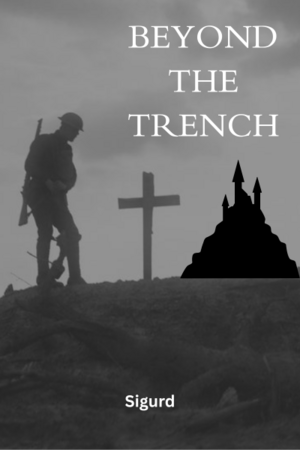Chapter 12:
Slums
Beyond the Trench
Night was drawing close. Torchlight spilled over the darkness of the earth and mixed with the shaded blues from the three moons coming overhead. Foreign stars hailed the men of another world, sticking close together while wandering. In their efforts to map the city, Dave and Watermann stumbled into the poor sectors. Lamps guided the way on some paths, but others were pitch black. People slept outside the inns, and families huddled under cloth and hay. Wafts of moist poverty spilled over them. It smelled of sweat. They pooled their money and tried to scout a place to stay through context clues alone.
In total, they had:
300 Republik Papiermarks (War-time Lamian Blue-backs),
150 in pennies, some farthings,
A Golden Pocket Watch (off the table),
One Wedding Ring,
And some souvenirs found in shelled homes.
All with foreign heads, pressed with adulterated silver or worthless paper,
Of some foreign country not even the divine had heard of.
Dave preferred the term “campers,” or even vagabond, but the truth was in their faces.
“We’re broke.”
“—And homeless, don’t forget that.”
“Yes, and homeless.”
Without even a valuable coin in their possession, they simultaneously spat on the name of the Capital Mint in Aethel. They cursed General Graves, and the people who decided fiat was the future. It wasn’t like they could light a fire in the middle of town. That was asking for trouble from the local authorities. Dave sighed. Not much he could do about inflation, not when he was in his world, and definitely not now.
So, what could they do? The lieutenant flooded his head with possibilities, ranging from kowtowing at some inn keep hoping he’d get the idea, to robbing grannies of their purses, but it was no use. With only a paltry vocabulary of the local language, their agency escaped them. They had instruments to regain their autonomy, but they were respectable people in a foreign land. Champions of virtue of the Republic of Lamia. Outnumbered, too. So for now, their rifles had to rest. Dave scanned his surroundings. There were a few houses with a queue waiting outside, and the poor entered one at a time. God willing, the denizens were a merciful people.
So, waiting in their third line during their brief re-introduction to civilization, the soldiers tapped their boots and twiddled their thumbs. Everyone talked among themselves in the crowd, but neither modern man was privy to it. It was the ultimate form of isolation, but also, the ultimate privacy.
“When was the last time we really talked?”
“Hmm?” Dave said. “I dunno. Before the last offensive?”
“Good grief. I don’t even know how many days it’s been. I haven’t even kept count.”
“Yeah. Just some days marching on ahead like usual.”
An oppressive silence overtook them. Sure, there had been banter and revelation, small talk and quick chats, but the machinery of living had taken them here mindlessly like before. When each man tried to begin, they could only produce dropped vowels and stuttered glottal stops. Their hearts suddenly bottled up, and it felt like the last two human beings on earth couldn’t even say hello.
Watermann stared at the cobblestones between his feet, tracing the curves and lines that killed themselves in sharp turns. Dave was much the same, becoming vitally invested in the flame of a street lamp.
“I don’t like this,” the private finally whispered. “I can’t stand it when it gets like this. You and I, with all the time in the world.”
“Can’t even…”
“Can’t even…”
“Damn.”
“I…” Dave began. “Er, yes. I agree. This is unsatisfactory.”
“No, yeah,” he sighed. “You know what I mean.”
Their rifles dug into their backs as they leaned against the wall.
“Do you think it was right? What we did.”
“For what?”
“…”
“…”
“…was it our fault?”
Dave remembered the streamers and the bands playing through the nights and the marching trum-drum-thrumming in yawning boulevards. Jackboots pacing a rhythm of the nation’s heart the train cars rolling locomotives howling hot air into streams lining the land. Bayonets forming picket lines and gleaming through pitch night. Ceremonial torches burning in his youth; the review of the grand armies.
“You’ll have to take it up with the man who first coveted,” Dave said.
When it was their turn to enter the room, neither man could face the other.
A round, rather pleasant woman greeted the two as they entered the poorhouse. People sat huddled against a central fire pit with ventilation. Families and mothers nursing their young to the soothing lullabies sung in velvet tongues. There were many beast-folk here. One attendant, dressed in religious garb of some kind, addressed the two men.
Of course, they couldn’t understand her. Dave tried to motion his intent, speaking the phrases and words he’d picked up on his careful observation of the language, but she stood more confused.
“Please, Ma’am,” eventually, he gave up entirely and pleaded in his tongue. “We request lodging. A place to stay. We can make it worth your while!” Dave pointed to the measly silver coins in his hand, hoping she couldn’t see the foreign letters and icons. “Silver. We pay!”
She cupped his hand, closing his fingers one by one until they held the silver, and pushed it back to him. The woman looked at him with sympathy, but one reserved for the insane. In a maternal, patronizing way, she cleared room for the men to set aside their things and sit by the fire. Her apron swished across the room, and she bid them good night.
“Does she think us mad?” Dave muttered.
“She’d be right for one of us.”
“Quiet, you.”
“Make me.”
The lieutenant glared harshly, tearing into the soul of the private. Thoroughly cowed, Watermann relented.
“Sorry, sir.”
“Keep your head on.”
“Right.”
Dave took out his greatcoat—stowed away in the morning—and rested his head. There was a couple across the fire from him. Some beast-kind with rabbit ears and features. The children crawled on them and groped their faces as they tried to entertain them with little coos and faces. He turned away, burned. He clutched his pocket watch tight, and the little silver halide face within was all that remained of her.




Please sign in to leave a comment.